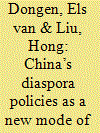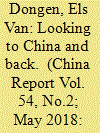| Srl | Item |
| 1 |
ID:
149302


|
|
|
|
|
| Summary/Abstract |
Existing studies of Chinese diaspora policies have mostly focused on the evolution and content of these policies, which tend to be confined within the realm of domestic politics. Against the backdrop of China’s increasing integration into the global economy, as well as its expanding interests abroad, this article goes beyond the existing frameworks in the studies of both domestic Chinese politics and diaspora relations by analyzing China’s diaspora policies from the angle of transnational governance. Relying on policy documents, relevant data from institutions involved, and interviews and participatory observation at both central and provincial levels, the article argues that a state-centered approach in which the Chinese overseas are ‘coopted’ neglects how the engagement with transnational social actors, especially the new migrants, alters existing state structures and how the actions of Chinese overseas are driven by various motives and interests.
|
|
|
|
|
|
|
|
|
|
|
|
|
|
|
|
| 2 |
ID:
159344


|
|
|
|
|
| Summary/Abstract |
Against the background of the rise of ‘diaspora institutions’ since the early 2000s, this commentary reflects on China’s diaspora engagement and India’s interest in it in the context of its own institutionalisation of diaspora engagement since the early 2000s. It argues that notwithstanding historical and political differences, some lessons could be learned from China. These pertain to the importance of recognising the various segments of the diaspora; the role of community organisations; the centrality of diaspora research; and the connection between diaspora policies and shifting national priorities. However, both in China and in India, some principal limits remain in terms of diaspora engagement due to the prioritising of the socio-economically advantaged; the tension among cultural, ethnic and territorial understandings of the nation; and because political inclusion lags behind the focus on economic and knowledge contributions. These limits lead us to reconsider some of the shared ideas, assumptions and practices behind the rise of ‘diaspora institutions’ in a broader sense.
|
|
|
|
|
|
|
|
|
|
|
|
|
|
|
|